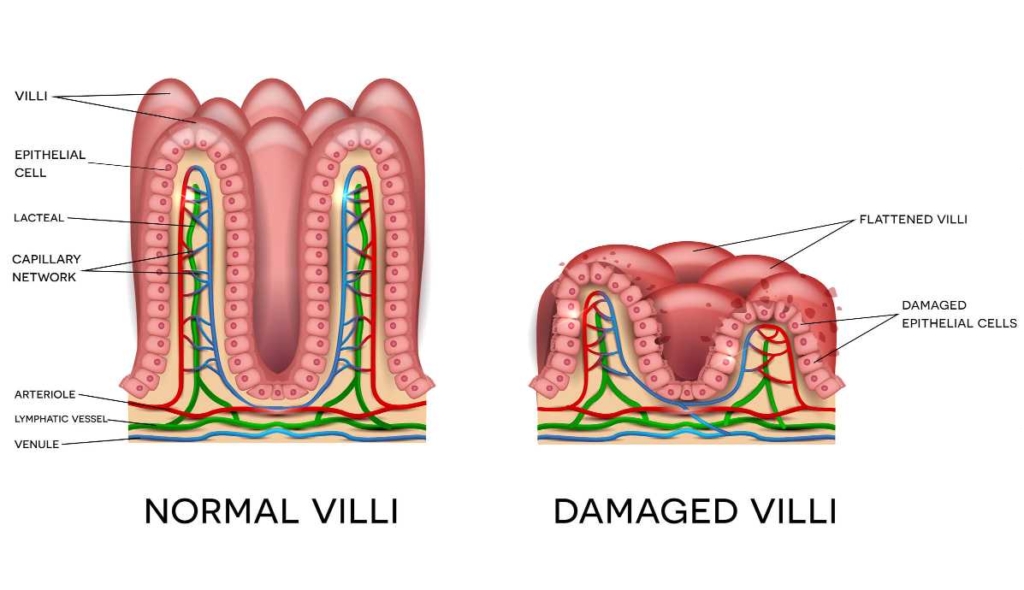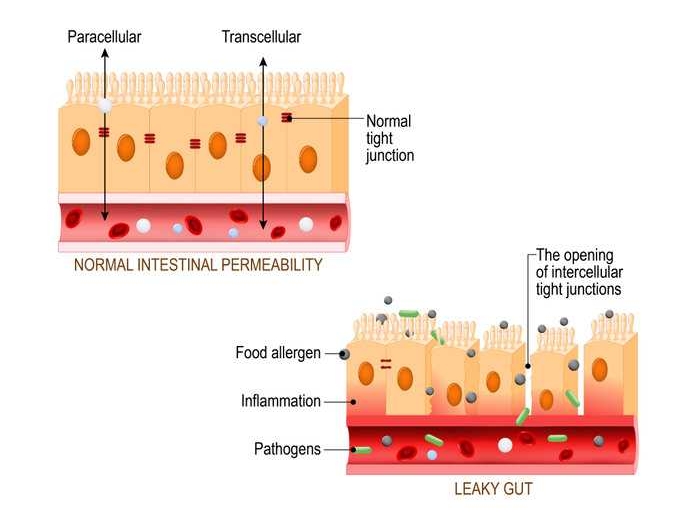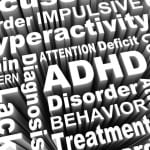Celiac Disease & Gluten Intolerance
Celiac disease (CD) is an autoimmune disorder, not a food allergy, affecting 1 out of 133 people. It is characterized by the damage and atrophy of the villi of the intestinal cell lining. The villi are finger-like extensions that extend from the wall of the small intestine into the lumen.
The primary role of these villi is to absorb nutrients from the foods we consume. This damage leads to an increase in the space between cells, allowing food particles to enter the bloodstream (also referred to as intestinal permeability or “leaky gut”), and triggers an inflammatory immune response.
Researchers believe that autoimmune diseases, like Celiac disease, are caused when a combination of genetic and environmental factors combine, activate the immune system, and trigger the onset of symptoms. Environmental triggers that can help set off Celiac disease include certain foods (gluten), viral infections, heavy metal toxicity (mercury), medications (antacids, NSAIDs), stress, biotoxins, & depression.
Most people who have a genetic susceptibility to CD will never develop the disease, however, those who do can experience a wide range of unpleasant and sometimes debilitating symptoms to no discomforting symptoms whatsoever.
Identifying Celiac Disease
The overwhelming majority of people with Celiac disease remain undiagnosed, and the average number of years between disease onset and diagnosis is 11 years. Why? Because so often the symptoms are extra-intestinal and can be confused for other health conditions with similar symptoms.
Without a thorough investigation of your health history to look for past physical and emotional traumas, underlying disorders, and other imbalances – that are often overlooked in a typical conventional medicine setting as a cause of CD – there is an increased risk of missing the diagnosis. Additional diagnostic tools to identify CD include blood testing, a small intestine biopsy, and perhaps most importantly, implementing a gluten-free diet.
If you have already been diagnosed with Celiac disease and adopted a gluten-free diet, and continue to experience discomfort, fatigue, or other symptoms, you may have received an incorrect or incomplete diagnosis.
4 Types of Celiac Disease and Their Symptoms
There are 4 types of Celiac disease, characterized by their differing presentation of symptoms.
- “TYPICAL”: Symptoms are primarily gastrointestinal, such as diarrhea, weight loss, abdominal pain, anorexia, lactose intolerance, and bloating.
- “ATYPICAL”: Minimal to no gastrointestinal signs or symptoms. Common extra-intestinal symptoms include iron deficiency/anemia, atopic problems (skin conditions), chronic fatigue, joint pain, infertility or recurrent fetal loss, neurologic disorders (ex, neuropathies), nutritional deficiencies, ADD, osteoporosis/osteopenia, other autoimmune disorders, and migraines.
- “SILENT”: No gastro- or extraintestinal symptoms however, their intestinal mucosal damage is present and CD autoimmunity can be detected in the blood work.
- “LATENT”: Individuals with the “latent” form of CD are genetically predisposed and have autoimmune markers present in the blood work. However, there is no mucosal damage and may or may not be symptomatic.
Functional Medicine for Treating Celiac Disease
For more than 30 years, the Kaplan Center for Integrative Medicine has gained a national reputation for treating some of the toughest cases of chronic pain and illness, including Celiac disease. Our physicians understand that there is no one-size-fits-all approach, especially when it comes to autoimmune disorders. We use a Functional Medicine approach to look at how all the body’s systems are working together and utilize a variety of treatments to treat the root cause or causes of inflammation. We use an integrative treatment plan that combines the best of conventional treatments with alternative therapies for optimum results.
Treatments will focus on strengthening the gut microbiome, reducing your toxic load, lowering stress, taking a thorough look at your diet to identify food sensitivities and nutritional deficiencies. We will also help you establish an exercise routine you can stick with and optimize your weight.
Therapies we have found to be effective in our Celiac disease treatment protocol include:
- Acupuncture
- Nutritional Counseling
- Herbal Remedies & Nutritional Supplements
- Prescription Medication
- Intravenous Supplementation
- Stress Management
Fortunately, once diagnosed, most people with Celiac disease/gluten intolerance quickly begin to feel better.
We are here for you, and we want to help.
Our goal is to return you to optimal health as soon as possible. To schedule an appointment please call: 703-532-4892 x2





